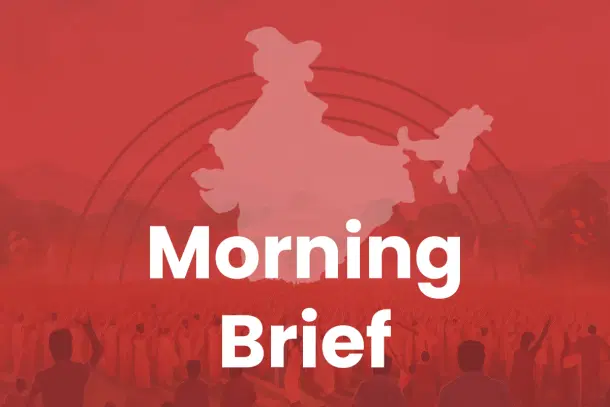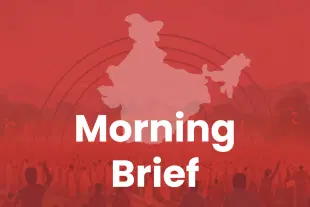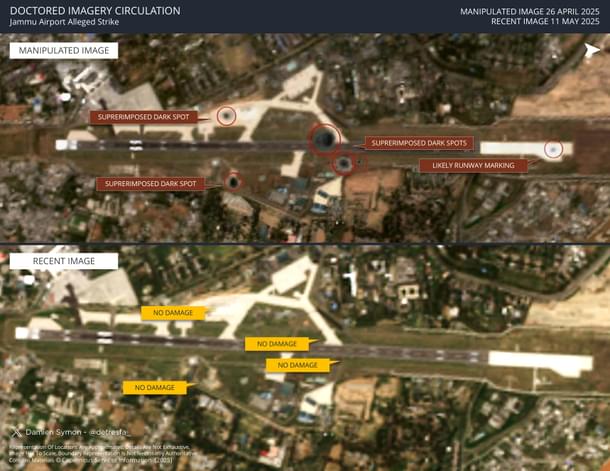News Brief
Morning Brief: PoK Return Sole Focus, No Mediation Needed: Modi Told Vance; Navy Was Positioned To Strike Karachi; Pakistan Circulating Doctored Satellite Imagery; And More
Swarajya Staff
May 12, 2025, 08:20 AM | Updated 08:20 AM IST
Save & read from anywhere!
Bookmark stories for easy access on any device or the Swarajya app.


Kick-start your morning with Swarajya’s Morning Brief – your news fix, curated for clarity and insight.
PoK Return Is The Only Issue For Discussion, No Mediation: Modi Told Vance
Prime Minister Narendra Modi told US Vice President JD Vance that the only issue India is willing to discuss with Pakistan is the return of Pakistan-occupied Kashmir, and no other matter. He emphasised that talks would only be possible if Pakistan addresses the issue of terror. When Vance mentioned that the Pakistanis might escalate dramatically, Modi reportedly told him that the Indian response would be overwhelming.
Vance had called him to request that India provide Pakistan with an off-ramp from the crisis that would prevent them from losing face at home.
Modi firmly rejected any possibility of third-party mediation, stating that India does not require or accept such involvement. Following recent attacks by Pakistan, India retaliated by striking Pakistan airbases, signaling a firm and decisive stance.
The Prime Minister declared that India is now operating under a "new normal," where provocations will be met with overwhelming force.
Pakistan Circulating Doctored Satellite Imagery To Back Claims
Pakistan is circulating manipulated images to support claims of successful strikes on Indian military targets. One such image, allegedly showing damage at Jammu Airport, was debunked by OSINT expert Damien Symon, who confirmed it was doctored and dated before May 9–10, 2025.

Claims of damage at Udhampur Airport were also disproven, with recent satellite images revealing no visible damage, suggesting that ongoing runway maintenance may have been misrepresented. Even Pakistan’s official imagery, which allegedly shows damage away from the airstrip, casts doubt on the claim of a precise strike.
Additionally, Pakistan's assertion of hitting India's S-400 air defense system remains unverified, as no credible evidence or satellite imagery has been presented.
Indian Navy Was Positioned To Strike Karachi
Vice Admiral AN Pramod revealed that the Indian Navy was positioned to strike select targets, including Karachi, during Operation Sindoor, which was launched in retaliation for the Pahalgam attack. The Navy maintained a forward-deployed and decisive posture in the Arabian Sea, ready to act at the time of India's choosing.
Operation Sindoor, launched on 7 May, saw the Army and Air Force conducting precision strikes on terror hideouts in Pakistan and Pakistan-occupied Kashmir, while the Navy remained on standby. The Navy's forward deployment forced Pakistan to adopt a defensive posture, keeping most of its forces within harbors or near the coast.
Other Developments
Suspected Drone Activity Triggers Blackout
Suspected drones launched from across the International Border were spotted in Rajasthan’s Barmer district on Sunday night (11 May). In response, authorities enforced a strict blackout, urging residents to stay indoors and turn off all lights.
The Indian Army confirmed that the night remained largely peaceful, with no untoward incidents reported. Jammu & Kashmir and other areas along the International Border also experienced a calm night. This marked the first peaceful night along the frontier after several days of Pakistani drone intrusions.
India Releases Names of Pakistani Military Officials At Terrorists' Funerals
India has revealed the names of Pakistani military officials who attended the funerals of terrorists killed in the May 7 strikes. Coffins draped in Pakistani flags were seen during the ceremonies, contradicting Pakistan's claim that the deceased were civilians.
The presence of these officials and the flag on the coffins raises serious questions about the involvement of Pakistan's military in supporting terrorism.
Hafiz Abdul Rauf, a Lashkar-e-Taiba (LeT) terrorist, led funeral prayers for three men killed in Indian strikes on a terror camp in Muridke, near Lahore. Civil officials, and members of the banned Jamaat-ud-Dawah (JuD), founded by Hafiz Saeed, were also present.
10 Satellites Ensuring Security With Round-The-Clock Operations: ISRO
Amid tensions, ISRO has stated that 10 satellites are working round-the-clock for ensuring national security. ISRO has launched 127 Indian satellites, including surveillance ones like Cartosat, RISAT, EMISAT, and MicroSat, designed for specific security tasks.
Recently, IN-SPACe Chairman Pawan Kumar Goenka announced plans to launch a constellation of 52 satellites over the next five years to enhance India's space-based surveillance, involving both the government and private sector.
ISRO's comments come ahead of the May 18 launch of the EOS-09 radar imaging satellite, which will further strengthen India's surveillance capabilities along its sensitive borders.
India's Economy Likely At Grow 6.5-6.9 Per Cent In Q4 Of FY25
With increased consumption, India's economy is projected to have grown between 6.5 per cent and 6.9 per cent in the January-March quarter of FY25. The government will officially announce the growth figures for Q4 and the full fiscal year on 30 May.
While Q4 growth may be the highest in four quarters, it is still expected to be lower than the earlier projection of 7.6 per cent. Economists are hopeful that the full fiscal growth will range from 6.2 per cent to 6.4 per cent, with revisions expected for the first three quarters. The fourth quarter benefitted from events like the Maha Kumbh and continued rural demand, with FMCG growth driven by rural markets and smaller packs.
US And China Reach Trade Deal In Geneva
The White House has announced that the US and China reached a trade deal in Geneva after two days of talks, with US Treasury Secretary Scott Bessent describing the discussions as "productive." Further details of the deal will be released on today (12 May), with US emphasising the need to address the US’s $1.2 trillion trade deficit.
While trade tensions between the US and China had benefitted India, the potential resolution of these issues could reduce India's competitive advantage, as Chinese exporters may regain ground.
Despite the US tariffs, China's overall exports rose, and the country showed eagerness to rebalance trade with the US. President Trump praised the talks, calling them a "total reset" and emphasising progress in opening up China to American business.
You’re all caught up—until next time.





